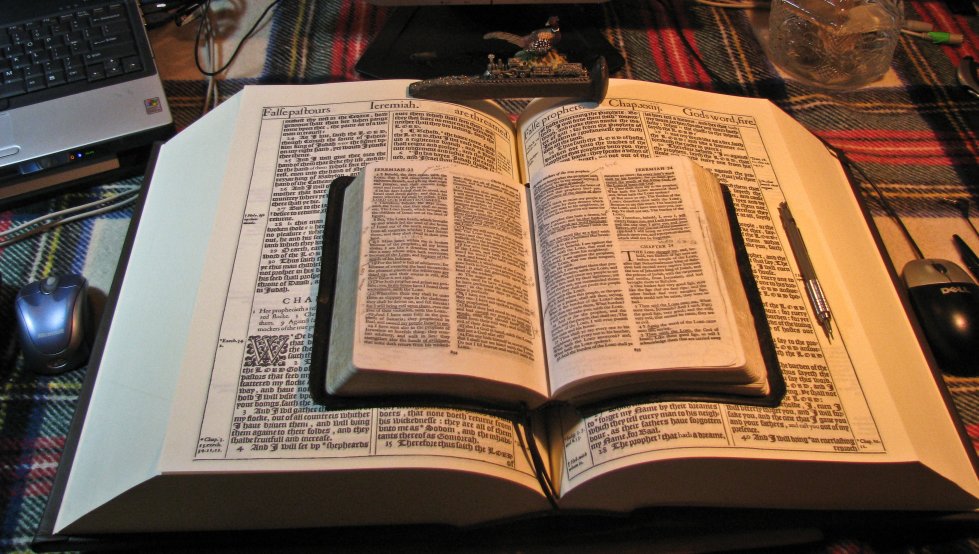 |
 |
Clearing
Up the Confusion
of
Many Versions of the Bible
Pastor Carl Graham
One of the biggest problems people have in todayís world is trying to decide what to select from among the many choices available. There are so many varieties for any named item that one almost has to close his eyes and pick. Take cars for example, there are so many makes and models that you hardly ever see two of the same kind any more. It is the same with appliances, cereal, bread, milk, or anything else you want to name; there are just too many choices.Unfortunately, it is the same with English versions of the Bible. There are so many choices among those that claim to say essentially the same things, but yet each claims to be superior. The end results of too many choices with too many claims always generate confusion with a person never being totally sure.
Hopefully, this short article will help clear up some of the confusion of Bible selection.
When one selects an English Bible for personal use
it is well to understand the underlying New Testament text
for each version considered.While there are as many opinions of how the Bible should read as there are scholars, the one fact to keep in mind is that there are only four Greek texts that underlie all the now available Bibles.
1. Westcott/Hort Text
2. The Nestle/Aland Text
3. The United Bible Society Text
4. Received TextThe first three all basically agree and are the Greek sources for all the modern English Bibles except the New King James Version which has for itís Greek source a variation of the Received Text. The King James Bible is the only version that is translated from the original Received Text.
The basis for selection then has to tie back into oneís 'theological persuasion' regarding the inspiration of the Scriptures. This varies from the Bible just being another book to accepting it as the inerrant Word of God. It also has to do with what one accepts or rejects in relation to the Greek texts.
Based on the assumptions made by textual critics, it is fair to say that the Westcott/Hort, Nestle/Aland, and United Bible Society texts are all based on treating the Bible as an ordinary piece of literature. It is common to have liberal theologians, and in some cases, people who are not of the Christian faith on the textual committees. The claim is made that this is the best way to get back to the original writings, but nothing is ever mentioned about inerrancy, or inspiration of the original documents for that matter. The text that is produced in this fashion is no more than another secular Greek book.
Those who subscribe to the Received Text, even though it is a 'critical text', believe it was composed with the manuscripts which were used by the church since the original documents were written, and it reflects the scriptures as God preserved them for the church. They believe that it is folly to believe that God would give us an inerrant Bible, let it get corrupted for 19 centuries, and then in these last days raise up liberal scholars who can give us the true Word. The Received Text advocates would say that it is the nearest we have to the original Greek text available today and that it presents all the truths God has for mankind.
While the text underlying a specific version of the Bible is important, it is not the sole selection factor, for it must be
tied into the elementary beliefs of the professing Christian, today, who is looking for a version to suit himself. Basically, there are four broad categories of professing 'Christians' today.1. There is the liberal who accepts the Bible as a book of literature. It is this philosophy that is behind all the texts produced by textual criticism.
2. There is the moderate who accepts the Bible as an inspired book, not as the inspired Word of God but as a book whose writers were inspired.
3. There is the person who professes to believe in inerrancy, but accepts the modern versions of the Bible, which are all translations of one of the liberal texts.
4. Then There is the person who professes to believe in inerrancy, believes that God has providentially preserved the Scriptures and accepts only translations based solely on the Received Text.
In order to select a Bible for personal use, one has to identify himself with one of the above categories.
If you are a Liberal, it doesnít matter which Bible you select because YOU wonít believe it anyway.
If you are a Moderate, youíll probably want to purchase the latest English version of the Bible
to make sure you have the current scholarly opinion about what God has said
so it can match what YOU want it to say and to what YOU want to believe.If you are an Inerrantist who accepts the works of the liberal scholars in textual matters,
then you have a job on your hands for you have to decide
which Bible has the least number of errors with the final decision being YOUR own opinion.If you are an inerrantist who accepts the providential preservation of Godís Holy Word,
then your choice is easy for there is only one Bible that meets this criteria,
the King James Bible.
Whether you like it or not, you believe that Book to be the WORD OF GOD!
* * * * * * *Jesus said, "Heaven and earth shall pass away, but my words shall not pass away. " Matt. 24:35